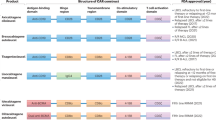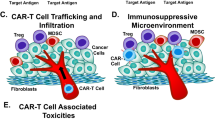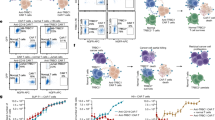Abstract
DNA-hypomethylating agents are a viable treatment option for AML/myelodysplastic syndrome (MDS) relapse after allograft by upregulating Ags on blasts before DLI. Seventy-two patients with relapsed AML (n=62), MDS (n=8) and other myeloid neoplasms (n=2) after allograft were treated with low-dose 5-azacytidine and, if feasible, DLI. Patient characteristics: median age 62 years (range 20–75), 42% with adverse cytogenetics, 82% not in remission at transplant and 83% received fludarabine-based reduced-toxicity conditioning. Median duration from transplant to 5-azacytidine was 289 days (range 59–2133). Response criteria: CR, temporary disease control or treatment failure. A median of 2.7 courses (range 1–10) were administered; 65 out of 72 patients also received DLI (41 already before 5-azacytidine). Ten patients developed acute GVHD and two succumbed to treatment-related sepsis. CR rate was 9.7% (in two patients lasting >5 years), 44% had temporary disease control (median duration 71 days, range 31–380). Median survival from 5-azacytidine was 108 days, 21 patients proceeded to subsequent transplant. In multivariate analysis, peripheral blood blasts <1% were predictive of longer OS (P=0.03). Taken together, long-term remissions can be induced by this well-tolerated outpatient treatment, particularly in patients without peripheral blood blasts.
This is a preview of subscription content, access via your institution
Access options
Subscribe to this journal
Receive 12 print issues and online access
$259.00 per year
only $21.58 per issue
Buy this article
- Purchase on Springer Link
- Instant access to full article PDF
Prices may be subject to local taxes which are calculated during checkout


Similar content being viewed by others
References
Fenaux P, Mufti GJ, Hellström-Lindberg E, Santini V, Finelli C, Giagounidis A et al. Efficacy of azacitidine compared with that of conventional care regimens in the treatment of higher-risk myelodysplastic syndromes: a randomised, open-label, phase III study. Lancet Oncol 2009; 10: 223–232.
Lübbert M, Suciu S, Baila L, Rüter BH, Platzbecker U, Giagounidis A et al. Low-dose decitabine versus best supportive care in elderly patients with intermediate- or high-risk myelodysplastic syndrome (MDS) ineligible for intensive chemotherapy: final results of the randomized phase III study of the European Organisation for Research and Treatment of Cancer Leukemia Group and the German MDS Study Group. J Clin Oncol 2011; 29: 1987–1996.
Kantarjian HM, Thomas XG, Dmoszynska A, Wierzbowska A, Mazur G, Mayer J et al. Multicenter, randomized, open-label, phase III trial of decitabine versus patient choice, with physician advice, of either supportive care or low-dose cytarabine for the treatment of older patients with newly diagnosed acute myeloid leukemia. J Clin Oncol 2012; 30: 2670–2677.
Graef T, Kuendgen A, Fenk R, Zohren F, Haas R, Kobbe G . Successful treatment of relapsed AML after allogeneic stem cell transplantation with azacitidine. Leuk Res 2007; 31: 257–259.
Czibere A, Bruns I, Kröger N, Platzbecker U, Lind J, Zohren F et al. 5-Azacytidine for the treatment of patients with acute myeloid leukemia or myelodysplastic syndrome who relapse after allo-SCT: a retrospective analysis. Bone Marrow Transplant 2010; 45: 872–876.
Schroeder T, Czibere A, Platzbecker U, Bug G, Uharek L, Luft T et al. Azacitidine and donor lymphocyte infusions as first salvage therapy for relapse of AML or MDS after allogeneic stem cell transplantation. Leukemia 2013; 27: 1229–1235.
Jabbour E, Giralt S, Kantarjian H, Garcia-Manero G, Jagasia M, Kebriaei P et al. Low-dose azacitidine after allogeneic stem cell transplantation for acute leukemia. Cancer 2009; 115: 1899–1905.
Lübbert M, Bertz H, Wäsch R, Marks R, Rüter B, Claus R et al. Efficacy of a 3-day, low-dose treatment with 5-azacytidine followed by donor lymphocyte infusions in older patients with acute myeloid leukemia or chronic myelomonocytic leukemia relapsed after allografting. Bone Marrow Transplant 2010; 45: 627–632.
Lübbert M, Bertz H, Rüter B, Marks R, Claus R, Wäsch R et al. Non-intensive treatment with low-dose 5-aza-2′-deoxycytidine (DAC) prior to allogeneic blood SCT of older MDS/AML patients. Bone Marrow Transplant 2009; 44: 585–588.
Bertz H, Potthoff K, Finke J . Allogeneic stem-cell transplantation from related and unrelated donors in older patients with myeloid leukemia. J Clin Oncol 2003; 21: 1480–1484.
Fröhling S, Schlenk RF, Breitruck J, Benner A, Kreitmeier S, Tobis K et al. Prognostic significance of activating FLT3 mutations in younger adults (16 to 60 years) with acute myeloid leukemia and normal cytogenetics: a study of the AML Study Group Ulm. Blood 2002; 100: 4372–4380.
Döhner K, Schlenk RF, Habdank M, Scholl C, Rücker FG, Corbacioglu A et al. Mutant nucleophosmin (NPM1) predicts favorable prognosis in younger adults with acute myeloid leukemia and normal cytogenetics: interaction with other gene mutations. Blood 2005; 106: 3740–3746.
Breems DA, Putten WLJV, Greef GED, Zelderen-Bhola SLV, Gerssen-Schoorl KBJ, Mellink CHM et al. Monosomal karyotype in acute myeloid leukemia: a better indicator of poor prognosis than a complex karyotype. J Clin Oncol 2008; 26: 4791–4797.
Platzbecker U, Wermke M, Radke J, Oelschlaegel U, Seltmann F, Kiani A et al. Azacitidine for treatment of imminent relapse in MDS or AML patients after allogeneic HSCT: results of the RELAZA trial. Leukemia 2012; 26: 381–389.
Phillips CL, Davies SM, McMasters R, Absalon M, O’Brien M, Mo J et al. Low dose decitabine in very high risk relapsed or refractory acute myeloid leukaemia in children and young adults. Br J Haematol 2013; 161: 406–410.
De Lima M, Giralt S, Thall PF, de Padua Silva L, Jones RB, Komanduri K et al. Maintenance therapy with low-dose azacitidine after allogeneic hematopoietic stem cell transplantation for recurrent acute myelogenous leukemia or myelodysplastic syndrome. Cancer 2010; 116: 5420–5431.
Goodyear OC, Dennis M, Jilani NY, Loke J, Siddique S, Ryan G et al. Azacitidine augments expansion of regulatory T cells after allogeneic stem cell transplantation in patients with acute myeloid leukemia (AML). Blood 2012; 119: 3361–3369.
Sánchez-Abarca LI, Gutierrez-Cosio S, Santamaría C, Caballero-Velazquez T, Blanco B, Herrero-Sánchez C et al. Immunomodulatory effect of 5-azacytidine (5-azaC): potential role in the transplantation setting. Blood 2010; 115: 107–121.
Schroeder T, Fröbel J, Cadeddu R-P, Czibere A, Dienst A, Platzbecker U et al. Salvage therapy with azacitidine increases regulatory T cells in peripheral blood of patients with AML or MDS and early relapse after allogeneic blood stem cell transplantation. Leukemia 2013; 27: 1910–1913.
Goodyear O, Agathanggelou A, Novitzky-Basso I, Siddique S, McSkeane T, Ryan G et al. Induction of a CD8+ T-cell response to the MAGE cancer testis antigen by combined treatment with azacitidine and sodium valproate in patients with acute myeloid leukemia and myelodysplasia. Blood 2010; 116: 1908–1918.
Almstedt M, Blagitko-Dorfs N, Duque-Afonso J, Karbach J, Pfeifer D, Jäger E et al. The DNA demethylating agent 5-aza-2′-deoxycytidine induces expression of NY-ESO-1 and other cancer/testis antigens in myeloid leukemia cells. Leuk Res 2010; 34: 899–905.
Yang H, Bueso-Ramos C, DiNardo C, Estecio MR, Davanlou M, Geng Q-R et al. Expression of PD-L1, PD-L2, PD-1 and CTLA4 in myelodysplastic syndromes is enhanced by treatment with hypomethylating agents. Leukemia 2014; 28: 1280–1288.
Tessoulin B, Delaunay J, Chevallier P, Loirat M, Ayari S, Peterlin P et al. Azacitidine salvage therapy for relapse of myeloid malignancies following allogeneic hematopoietic SCT. Bone Marrow Transplant 2014; 49: 567–571.
Griffiths EA, Srivastava P, Collamat G, James SR, Ford LA, Wetzler M et al. Decitabine treatment induces NY-ESO1 promoter hypomethylation, transcription and protein expression in circulating AML blasts. Leuk Res 2013; 37: S132.
Toffalori C, Riba M, Zito L, Barcella M, Spinelli O, Crucitti L et al. CIITA-dependent transcriptional downregulation of HLA Class II results in leukemia immune escape and relapse after allogeneic HSCT. EBMT Annual Meeting 2014 abstract PH-O129.
Acknowledgements
We thank Irmgard Matt for excellent support with data acquisition.
Author information
Authors and Affiliations
Corresponding author
Ethics declarations
Competing interests
The authors declare no conflict of interest.
Additional information
Supplementary Information accompanies this paper on Bone Marrow Transplantation website
Supplementary information
Rights and permissions
About this article
Cite this article
Steinmann, J., Bertz, H., Wäsch, R. et al. 5-Azacytidine and DLI can induce long-term remissions in AML patients relapsed after allograft. Bone Marrow Transplant 50, 690–695 (2015). https://doi.org/10.1038/bmt.2015.10
Received:
Revised:
Accepted:
Published:
Issue Date:
DOI: https://doi.org/10.1038/bmt.2015.10
This article is cited by
-
Venetoclax plus azacitidine and donor lymphocyte infusion in treating acute myeloid leukemia patients who relapse after allogeneic hematopoietic stem cell transplantation
Annals of Hematology (2022)
-
Hypomethylating agents (HMA) for the treatment of acute myeloid leukemia and myelodysplastic syndromes: mechanisms of resistance and novel HMA-based therapies
Leukemia (2021)
-
Demethylating therapy increases anti-CD123 CAR T cell cytotoxicity against acute myeloid leukemia
Nature Communications (2021)
-
Donor lymphocyte infusions after first allogeneic hematopoietic stem-cell transplantation in adults with acute myeloid leukemia: a single-center landmark analysis
Annals of Hematology (2021)
-
Methods to prevent and treat relapse after hematopoietic stem cell transplantation with tyrosine kinase inhibitors, immunomodulating drugs, deacetylase inhibitors, and hypomethylating agents
Bone Marrow Transplantation (2019)



